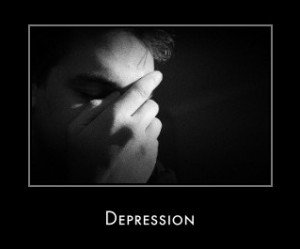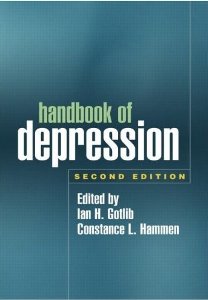|
Depression TreatmentThinking About Becoming A Psychology Student? Find A Psychology School Near YouDepression Treatment
(photo Credit: Lloyd Morgan) The following information is provided courtesy of The National Institute of mental Health. Depression TreatmentDepression, even the most severe cases, is a highly treatable disorder. As with many illnesses, the earlier that treatment can begin, the more effective it is and the greater the likelihood that recurrence can be prevented. The first step to getting appropriate treatment is to visit a doctor. Certain medications, and some medical conditions such as viruses or a thyroid disorder, can cause the same symptoms as depression. A doctor can rule out these possibilities by conducting a physical examination, interview and lab tests. If the doctor can eliminate a medical condition as a cause, he or she should conduct a psychological evaluation or refer the patient to a mental health professional. The doctor or mental health professional will conduct a complete diagnostic evaluation. He or she should discuss any family history of depression, and get a complete history of symptoms, e.g., when they started, how long they have lasted, their severity, and whether they have occurred before and if so, how they were treated. He or she should also ask if the patient is using alcohol or drugs, and whether the patient is thinking about death or suicide. Once diagnosed, a person with depression can be treated with a number of methods. The most common treatments are medication and psychotherapy. Medication Antidepressants work to normalize naturally occurring brain chemicals called neurotransmitters, notably serotonin and norepinephrine. Other antidepressants work on the neurotransmitter dopamine. Scientists studying depression have found that these particular chemicals are involved in regulating mood, but they are unsure of the exact ways in which they work. The newest and most popular types of antidepressant medications are called selective serotonin reuptake inhibitors (SSRIs). SSRIs include fluoxetine (Prozac), citalopram (Celexa), sertraline (Zoloft) and several others. Serotonin and norepinephrine reuptake inhibitors (SNRIs) are similar to SSRIs and include venlafaxine (Effexor) and duloxetine (Cymbalta). SSRIs and SNRIs are more popular than the older classes of antidepressants, such as tricyclics–named for their chemical structure–and monoamine oxidase inhibitors (MAOIs) because they tend to have fewer side effects. However, medications affect everyone differently–no one–size–fits–all approach to medication exists. Therefore, for some people, tricyclics or MAOIs may be the best choice. People taking MAOIs must adhere to significant food and medicinal restrictions to avoid potentially serious interactions. They must avoid certain foods that contain high levels of the chemical tyramine, which is found in many cheeses, wines and pickles, and some medications including decongestants. MAOIs interact with tyramine in such a way that may cause a sharp increase in blood pressure, which could lead to a stroke. A doctor should give a patient taking an MAOI a complete list of prohibited foods, medicines and substances. For all classes of antidepressants, patients must take regular doses for at least three to four weeks before they are likely to experience a full therapeutic effect. They should continue taking the medication for the time specified by their doctor, even if they are feeling better, in order to prevent a relapse of the depression. Medication should be stopped only under a doctor's supervision. Some medications need to be gradually stopped to give the body time to adjust. Although antidepressants are not habit–forming or addictive, abruptly ending an antidepressant can cause withdrawal symptoms or lead to a relapse. Some individuals, such as those with chronic or recurrent depression, may need to stay on the medication indefinitely. In addition, if one medication does not work, patients should be open to trying another. NIMH–funded research has shown that patients who did not get well after taking a first medication increased their chances of becoming symptom–free after they switched to a different medication or added another medication to their existing one. Sometimes stimulants, anti–anxiety medications, or other medications are used in conjunction with an antidepressant, especially if the patient has a co–existing mental or physical disorder. However, neither anti–anxiety medications nor stimulants are effective against depression when taken alone, and both should be taken only under a doctor's close supervision. What Are The Side Effects of Antidepressants? Antidepressants may cause mild and often temporary side effects in some people, but they are usually not long–term. However, any unusual reactions or side effects that interfere with normal functioning should be reported to a doctor immediately. The most common side effects associated with SSRIs and SNRIs include: Headache usually temporary and will subside. Nausea temporary and usually short–lived. Insomnia and nervousness (trouble falling asleep or waking often during the night) may occur during the first few weeks but often subside over time or if the dose is reduced. Agitation (feeling jittery). Sexual problems, both men and women can experience sexual problems including reduced sex drive, erectile dysfunction, delayed ejaculation, or inability to have an orgasm. Tricyclic antidepressants also can cause side effects including: Dry mouth, it is helpful to drink plenty of water, chew gum, and clean teeth daily. Constipation, it is helpful to eat more bran cereals, prunes, fruits, and vegetables. Bladder problems, emptying the bladder may be difficult, and the urine stream may not be as strong as usual. Older men with enlarged prostate conditions may be more affected. The doctor should be notified if it is painful to urinate. Sexual problems, sexual functioning may change, and side effects are similar to those from SSRIs. Blurred vision, often passes soon and usually will not require a new corrective lenses prescription. Drowsiness during the day, usually passes soon, but driving or operating heavy machinery should be avoided while drowsiness occurs. The more sedating antidepressants are generally taken at bedtime to help sleep and minimize daytime drowsiness. FDA Warning on Antidepressants Despite the relative safety and popularity of SSRIs and other antidepressants, some studies have suggested that they may have unintentional effects on some people, especially adolescents and young adults. In 2004, the Food and Drug Administration (FDA) conducted a thorough review of published and unpublished controlled clinical trials of antidepressants that involved nearly 4,400 children and adolescents. The review revealed that 4% of those taking antidepressants thought about or attempted suicide (although no suicides occurred), compared to 2% of those receiving placebos. This information prompted the FDA, in 2005, to adopt a "black box" warning label on all antidepressant medications to alert the public about the potential increased risk of suicidal thinking or attempts in children and adolescents taking antidepressants. In 2007, the FDA proposed that makers of all antidepressant medications extend the warning to include young adults up through age 24. A "black box" warning is the most serious type of warning on prescription drug labeling. The warning emphasizes that patients of all ages taking antidepressants should be closely monitored, especially during the initial weeks of treatment. Possible side effects to look for are worsening depression, suicidal thinking or behavior, or any unusual changes in behavior such as sleeplessness, agitation, or withdrawal from normal social situations. The warning adds that families and caregivers should also be told of the need for close monitoring and report any changes to the physician. The latest information from the FDA can be found on their Web site at www.fda.gov. Results of a comprehensive review of pediatric trials conducted between 1988 and 2006 suggested that the benefits of antidepressant medications likely outweigh their risks to children and adolescents with major depression and anxiety disorders. The study was funded in part by the National Institute of Mental Health. Also, the FDA issued a warning that combining an SSRI or SNRI antidepressant with one of the commonly-used "triptan" medications for migraine headache could cause a life-threatening "serotonin syndrome," marked by agitation, hallucinations, elevated body temperature, and rapid changes in blood pressure. Although most dramatic in the case of the MAOIs, newer antidepressants may also be associated with potentially dangerous interactions with other medications. What about St. John's wort? The extract from St. John's wort (Hypericum perforatum), a bushy, wild-growing plant with yellow flowers, has been used for centuries in many folk and herbal remedies. Today in Europe, it is used extensively to treat mild to moderate depression. In the United States, it is one of the top-selling botanical products. To address increasing American interests in St. John's wort, the National Institutes of Health conducted a clinical trial to determine the effectiveness of the herb in treating adults who have major depression. Involving 340 patients diagnosed with major depression, the eight-week trial randomly assigned one-third of them to a uniform dose of St. John's wort, one-third to a commonly prescribed SSRI, and one-third to a placebo. The trial found that St. John's wort was no more effective than the placebo in treating major depression. Another study is looking at the effectiveness of St. John's wort for treating mild or minor depression. Other research has shown that St. John's wort can interact unfavorably with other medications, including those used to control HIV infection. On February 10, 2000, the FDA issued a Public Health Advisory letter stating that the herb appears to interfere with certain medications used to treat heart disease, depression, seizures, certain cancers, and organ transplant rejection. The herb also may interfere with the effectiveness of oral contraceptives. Because of these potential interactions, patients should always consult with their doctors before taking any herbal supplement. Psychotherapy Several types of psychotherapy or "talk therapy" can help people with depression. Some regimens are short–term (10 to 20 weeks) and other regimens are longer–term, depending on the needs of the individual. Two main types of psychotherapies, cognitive–behavioral-therapy (CBT) and interpersonal therapy (IPT) have been shown to be effective in treating depression. By teaching new ways of thinking and behaving, CBT helps people change negative styles of thinking and behaving that may contribute to their depression. IPT helps people understand and work through troubled personal relationships that may cause their depression or make it worse. For mild to moderate depression, psychotherapy may be the best treatment option. However, for major depression or for certain people, psychotherapy may not be enough. Studies have indicated that for adolescents, a combination of medication and psychotherapy may be the most effective approach to treating major depression and reducing the likelihood for recurrence. Similarly, a study examining depression treatment among older adults found that patients who responded to initial treatment of medication and IPT were less likely to have recurring depression if they continued their combination treatment for at least two years. Electroconvulsive Therapy For cases in which medication and/or psychotherapy does not help alleviate a person's treatment–resistant depression, electroconvulsive therapy (ECT) may be useful. ECT, formerly known as "shock therapy," once had a bad reputation. But in recent years, it has greatly improved and can provide relief for people with severe depression who have not been able to feel better with other treatments. Before ECT is administered, a patient takes a muscle relaxant and is put under brief anesthesia. He or she does not consciously feel the electrical impulse administered in ECT. A patient typically will undergo ECT several times a week, and often will need to take an antidepressant or mood stabilizing medication to supplement the ECT treatments and prevent relapse. Although some patients will need only a few courses of ECT, others may need maintenance ECT, usually once a week at first, then gradually decreasing to monthly treatments for up to one year. ECT may cause some short-term side effects, including confusion, disorientation and memory loss. But these side effects typically clear soon after treatment. Research has indicated that after one year of ECT treatments, patients showed no adverse cognitive effects. What Efforts Are Underway To Improve Treatment? Researchers are looking for ways to better understand, diagnose and treat depression among all groups of people. New potential treatments are being tested that give hope to those who live with depression that is particularly difficult to treat, and researchers are studying the risk factors for depression and how it affects the brain. NIMH continues to fund cutting–edge research into this debilitating disorder. Depression HelpIf you know someone who is depressed, it affects you too. The first and most important thing you can do to help a friend or relative who has depression is to help him or her get an appropriate diagnosis and treatment. You may need to make an appointment on behalf of your friend or relative and go with him or her to see the doctor. Encourage him or her to stay in treatment, or to seek different treatment if no improvement occurs after six to eight weeks. To help a friend or relative: Offer emotional support, understanding, patience and encouragement. Engage your friend or relative in conversation, and listen carefully. Never disparage feelings your friend or relative expresses, but point out realities and offer hope. Never ignore comments about suicide, and report them to your friend's or relative's therapist or doctor. Invite your friend or relative out for walks, outings and other activities. Keep trying if he or she declines, but don't push him or her to take on too much too soon. Although diversions and company are needed, too many demands may increase feelings of failure. Remind your friend or relative that with time and treatment, the depression will lift. If you have depression, you may feel exhausted, helpless and hopeless. It may be extremely difficult to take any action to help yourself. But it is important to realize that these feelings are part of the depression and do not accurately reflect actual circumstances. As you begin to recognize your depression and begin treatment, negative thinking will fade. To help yourself: Engage in mild activity or exercise. Go to a movie, a ballgame, or another event or activity that you once enjoyed. Participate in religious, social or other activities. Set realistic goals for yourself. Break up large tasks into small ones, set some priorities and do what you can as you can. Try to spend time with other people and confide in a trusted friend or relative. Try not to isolate yourself, and let others help you. Expect your mood to improve gradually, not immediately. Do not expect to suddenly "snap out of" your depression. Often during treatment for depression, sleep and appetite will begin to improve before your depressed mood lifts. Postpone important decisions, such as getting married or divorced or changing jobs, until you feel better. Discuss decisions with others who know you well and have a more objective view of your situation. Remember that positive thinking will replace negative thoughts as your depression responds to treatment. More Depression InformationSee following link for information on what depression is, types of depression, symptoms of depression, what causes depression and depression in men, women, children and adolescents. Essential Depression ReadingHandbook of Depression, Second Edition by Ian H. Gotlib & Constance L. Hammen
Book Description Bringing together the field's leading authorities, this acclaimed work is widely regarded as the standard reference on depression. The Handbook provides comprehensive coverage of the epidemiology, course, and outcome of depressive disorders; issues in assessment and diagnosis; psychological and biological risk factors; effective approaches to prevention and treatment; and the nature of depression in specific populations. Each chapter offers a definitive statement of current theories, methods, and research findings, while also identifying key questions that remain unanswered. Reflecting significant developments in the field, the second edition is thoroughly updated and includes a number of new chapters and topics. See following link for more details: Handbook of Depression, Second Edition Classic Articles All Psychology Students Should Read
This special Kindle collection consists of the most influential, infamous and iconic research articles ever published in the history of psychology. See following link for full details. The Psychology Classics Kindle Collection Go Back To The Main Mental Health Page Go From Depression Treatment Back To The Home Page
|







